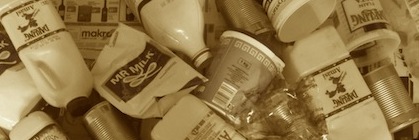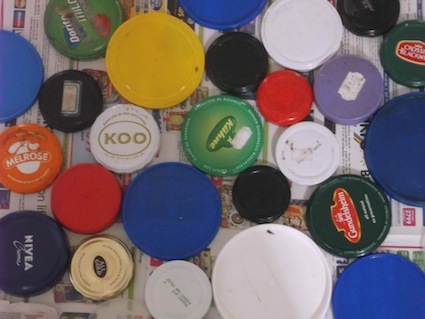Dear Reader, in this age of AI created content, please support with your goodwill someone who works harder to provide the human-made. Sign up in the righthand column or bottom of this page. You will receive my hand illustrated monthly newsletter RESTORE NATURE and access to the biodiversity garden design course as I write...and nothing else, I respect your time.
ZERO PACKAGING
THE WAY FORWARD

PLASTIC - FREE SHOPS
In the US and Europe, the possibility of shopping with zero packaging inflow is opening up. The focus is on the prevention of plastic waste.
In a German article, for which this is a liberal translation, the reason for focussing on reducing plastic is due to it being multi-purpose, light and practical, and this leading to ‘one of the biggest environmental problems of our time’ (https://utopia.de/ratgeber/plastikfreie-laeden/). The ubiquity and usefulness of plastic make it hard to do without. We need the co-operation of the producers and retailers to make it easier. A number of shops have opened in Germany, and in the US and England. The German shops offer all goods loose so that customers can take the exact amount needed or can bring their own packaging. Whether it is noodles, rice, pulses, coffee, sweet things, soap or washing powder, in these shops nearly everything is offered as loose goods. Most of the products are sold in large dispensers mounted on the wall (like the dried fruit, sweets and nuts dispensers in Food Lover’s Market in South Africa), so that one can dispense the goods oneself. Spices and herbs are spooned out of large jars. Vinegar and oil can be decanted from big canisters or jars, shower gel and detergents can also be decanted in the same way, eggs can be packed into your own holders and cheese into paper. The actual weight of your own containers brought from home is subtracted from the total so that one only pays for the produce. If you have not brought a container, they are available in the shops.
The concept of plastic free shops is as simple as it is forward looking. It saves untold quantities of plastic packaging, that require high energy expenditure in their production, and end up in the dustbin shortly after purchase. To allow the customer to dispense themselves reduces the wastage of food. Many of the packaging free shops place emphasis on regional production – only actually growing one’s own is more environmentally friendly.
The article lists some well known plastic free shops in Germany, Austria and Switzerland (https://utopia.de/ratgeber/plastikfreie-laeden). I was just thinking how far I’d have to drive if I lived in Germany now… Wuppertal to Mönchengladbach (61km) …uhm… I see a lot of stores opening in NRW Germany this year, Witten (40km) , Recklinhausen (51km), Köln (57km), and 5 online stores. I look forward to the expansion of this brilliant innovation to other towns, including Cape Town. As I pointed out, we already have nut dispensers in Fruit and Veg (Food Lover’s Market) and some other shops, so the dispensers, though plastic, are available to retail stores locally.
Why all the fuss about avoiding plastic ?
Plastic is generally made out of fossil fuel. It is in short supply and the processing is dirty. The disposal of plastic is also problematic: if it gets out into the environment, it can last hundreds of years, because normal plastic is not biodegradable. Plastic waste endangers the lives of many creatures on land and in the sea, as well as ourselves. In plastic substances can be found that are anything but healthy. It may also be toxic in very small doses which leak into your food.

aiming for zero packaging:
how to shop
To live completely without plastic is difficult but not impossible. It requires planning, time, information, and can-do talents. To reduce plastic consumption is however, not difficult.
In the usual supermarkets, discount stores and health shops, all products are packed somehow – a lot of them in aluminium cans, glass or cardboard, but the most are in plastic. In most supermarkets one only has the possibility to avoid plastic with the fruit and vegetables, and often not even that.
The German article offers some tips on how to come home with less waste plastic, which I note, is markedly tougher in South Africa:
Its easier to avoid plastic at the weekly markets (street stalls where you can buy vegetables and fruit) where the vendors offer their wares without packaging, and are often prepared to pack it into containers you’ve brought along. Its similar at farmer’s shops – but not everyone has one locally.
In Cape Town there is a street vegetable stall outside Shoprite Mowbray whose greens are often fresher than anything for sale instore, and there are others dotted around town, like Mr Perin at Rondebosch Park. Support the street vendors who sell without packaging. Food Lover’s market and Shoprite have some items unpackaged.
Some health shops in Germany offer veggies, fruit, grains, spices, meusli, tea and oils unpacked.
I just cannot afford the South African version of a 'Bio-laden' and I'm stuck with Shoprite and Food Lover's Market. This is why I am forced into activism to change them. Fruit and Vegetables may come unpacked, but it is different with cleaning aids and cosmetics. To avoid plastic its best to make your own cosmetics and cleaning agents. A tough call for a busy woman, but some things are actually quick and easy to use (see my article on cleaning aids made from items in the kitchen food cupboard). I use sunlight bar soap grated and dissolved in water (it makes a nice spoonable gel if left overnight) for washing dishes and clothes. It leaves a fresh un-perfumed odour of cotton on the clothes, very tasteful compared to your average washing powder's overkill.
In Germany there are unpackaged body-care products at Lush – they are not certified as natural cosmetics though, and the producers have often been criticized for problematic working conditions nd selling methods. Some online shops offer unpackaged (bio) body-care products like soaps, one can also sometimes get this in Bio-laden (something like health shops in South Africa, but hard to translate, we don’t have an entity like Bio-laden (shop selling everything eco) in South Africa). I will post any pertinent information regarding packaging free retailers as I find them in Cape Town on this website. Do you know of any other plastic-free shops or online stores ? let us know in a commentary or article about them !
Some tips on plastic free bathing can be found on the Zero –Waste blog Utopistin Spectaculatius. Information on cleaning with household products (that at least cause less plastic waste) you will find on the blog Utopistin “emmaradio”
no packaging:
the new retail trend
Original Unverpackt in Germany, and Catherine Conway
This is from an article in English on a new shop in Berlin called Original Unverpackt (original unpackaged) owned by Sara Wolf and Milena Glimbovski. The website invites sharing of pictures of good and bad packaging. Packaging free shopping works like this: as you come in your containers are weighed and labelled. This is deducted from the weight when you leave. The labels can sustain a few washings. The owners offer what the customer needs for their basic living, but not an enormous variety of brands, it’s a different kind of shopping.
There are also shops like this in Austin, Texas (In.Gredients, Catherine Conway) and London (Unpackaged). All three shops experiment with the psychology of consumption.
The UK produced approximately eleven million tons of packaging waste in 2011. Food waste campaigner Tristram Stuart says supermarkets aware of the trends have performed a super manipulative rebranding, where their re-usable and purchased shopping bags are branding and advertising surfaces for themselves, and they say they can reduce food waste by selling processed, peeled, chopped up food in plastic, like mangoes and bananas ! a little imp in my head is singing Woollies, woollies, or is it woo hee woo hee ?
waste reduction:
nothing new under the sun

Catherine Conway
shops in Europe
This is from an article by Zero Waste Europe on the retailer called ‘Unpackaged’. Your bin mainly contains packaging, food waste and paper. In Europe you pay twice for packaging, once when you buy the product, and again when you pay the council to remove your waste. Plastic packaging wastes resources at all levels, in production, storage, transport and disposal. Only some is recycled (see other articles on plastic on why its so hard to recycle) and most ends up polluting the environment through landfills and incineration.
Unpackaged, founded by Catherine Conway in Texas, is now in Europe. The mantra of Unpackaged is: reduce by only buying what you need, re-use by bringing your own containers for refill, recycle what you can’t re-use.
In a sensible world, we buy products not packaging and the producer can re-use the containers and save money.
In the comments section were a lot of prejudiced negative comments about packaging free shopping being a fairy tale. People have already forgotten how it was normal for our grandparents.
home page for green inspiration
Restore Nature Newsletter
I've been writing for four years now and I would love to hear from you
Please let me know if you have any questions, comments or stories to share on gardening, permaculture, regenerative agriculture, food forests, natural gardening, do nothing gardening, observations about pests and diseases, foraging, dealing with and using weeds constructively, composting and going offgrid.
SEARCH
Order the Kindle E-book for the SPECIAL PRICE of only
Prices valid till 30.09.2023
Recent Articles
-
Geography Research Task
Jan 31, 25 11:37 PM
To whom it may concern My name is Tanyaradzwa Madziwa and I am a matric student at Springfield Convent School. As part of our geography syllabus for this -
Eco Long Drop Pit Latrines Uganda
Nov 29, 24 02:45 AM
Good evening from the UK. My name is Murray Kirkham and I am the chairman of the International and foundation committee of my local Lindum Lincoln Rotary -
Landscape Architect
Oct 01, 24 10:42 AM
I so appreciate your informative description! Your experimentation and curiosity with the seeds, germination, and rearing of the maggot are exciting to
"How to start a profitable worm business on a shoestring budget
Order a printed copy from "Amazon" at the SPECIAL PRICE of only
or a digital version from the "Kindle" store at the SPECIAL PRICE of only
Prices valid till 30.09.2023





